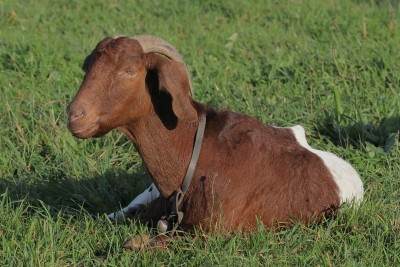Free Fecal Egg Count Testing to Improve Parasite Resistant Genetics
Amy Barkley, Team Leader & Livestock Specialist
Southwest New York Dairy, Livestock and Field Crops Program

Small Ruminant Producers:
Do you want more parasite resistant animals?
Summer 2021: Free Fecal Egg Count (FEC) analysis to assist with selective breeding for resistance to gastrointestinal worms
AVAILABLE TO:
New or current National Sheep Improvement Program (NSIP) members either in or marketing to the Northeast who want to generate Estimated Breeding Values (EBV) for parasite resistance.
● Producers must be able to obtain and ship fecal samples once or twice (at least 4 weeks later) following NSIP recommendations.
● Animals must NOT have been dewormed within 4 weeks of sampling.
● Fecal egg counts can be conducted for all young stock whose data is being submitted to NSIP.
● For more information on the benefits of membership in NSIP please visit http://nsip.org/ or contact the NSIP Program Director, Rusty Burgett, (info@nsip.org).
OR
Non-NSIP members living in New England, NY, NJ, PA, WV, MD, DE
● Have a history of problems with gastrointestinal nematode worms.
● Are FAMACHA© certified (online training program is available).
● Are willing to share FAMACHA© scores as well as general herd/flock information/history.
● Have the ability to obtain and ship fecal samples once or twice (at least 4 wks later).
● Animals must NOT have been dewormed within 4 weeks of sampling.
● To allow us to provide this service to the maximum number of producers we are focusing the FEC testing on young replacement animals.
FAMACHA© scores can be used to indicate that worm season is active and will provide fecal egg counts high enough for meaningful analysis (minimum herd average >500 eggs/g). Scores of 3 or higher in 10% or more of your flock/herd or an overall upward trend in FAMACHA© scores away from normal 1's and 2's indicate increasing parasite loads. Peak parasite season occurs typically from mid-July through mid-September in most of the U.S. NSIP producers should plan on submitting a first set up samples in July to allow for the 30 to 45 days needed before sending the second set of samples.
We prefer that first samples are taken by Mid-August 2021 but samples will be accepted foranalysis through September 30, 2021.
Please complete the Pre-Registration to receive further information.
Access the Pre-Registration by clicking here for the link.
Please contact Elizabeth Kass or Dr. Katherine Petersson, University of Rhode Island at urisheepandgoat@etal.uri.edu with any questions.
For more information on small ruminant parasite control visit our website at http://web.uri.edu/sheepngoat.
Upcoming Events
Boots in the Barn: Cornell Dairy Research Updates
January 13, 2026
January 20, 2026
January 27, 2026
February 3, 2026
February 10, 2026
February 17, 2026
February 24, 2026
Join us for some or all!
Deerworm and Flukes in Small Ruminants Webinar
February 25, 2026 : Deerworm and Flukes in Small Ruminants Webinar
Dr. Mary Smith from Cornell's College of Veterinary Medicine and Dr. Rachel White from UMaine Cooperative Extension will be discussing the lifecycles, signs, prevention, and management of deerworm and liver flukes in small ruminants.
NYSDEC How to Get Certified Course
March 3, 2026 : NYSDEC How to Get Certified Course
Ellicottville, NY
NYSDEC training course in preparation to take the pesticide applicator exam.
Announcements
Cows, Crops & Critters Newsletter Sponsorship
TRYING TO REACH GROWERS AND AGRIBUSINESSES IN OUR SOUTHWEST REGION OF NEW YORK?Weekly Email Update: Shared with 625+ households who have signed up with our program.
Monthly Paper Mailer: To reach our stakeholders and farmers who lack internet access, we send out a monthly mailer where your company's logo and contact information would be featured with a mailing list of 330+ households.
If you sponsor our weekly and monthly publications you reach approximately 955 households.





